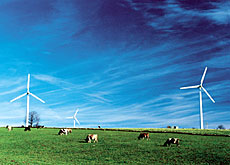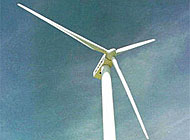Wind power blown off course

Cuts in national research programmes and popular opposition are threatening to paralyse projects aimed at boosting wind power in Switzerland.
Even environmentalists are raising doubts about the energy source, and not just on aesthetic grounds.
Switzerland, which was considered as being in the vanguard of research into and development of renewable sources of energy, now runs the risk of being overtaken by many other European countries.
Wind power in particular is being held back by unfavourable “currents”.
What took the wind out of the sales of “clean” energy was, above all, the decision taken by the Swiss on May 18 2003 to continue with nuclear energy in the decades to come.
The Swiss threw out two popular initiatives, which had demanded the abandonment of nuclear energy, and proposed extending research into, and use of, alternative sources of energy.
Renewable energy crisis
The popular verdict actually made it much easier for the government to take the decision to save money by halting subsidies to SwissEnergy (SFr55 million – $42 million – per annum).
The federal research and promotion programme for renewable energy sources could become one of the main casualties of the proposals being considered by parliament to put the federal finances back on an even keel.
Other financing solutions, such as an energy tax, hardly appear realistic in view of current political priorities and the economic recession.
Switzerland could see itself swimming against the tide. Various European countries have decided to invest in new energy sources, not only to protect the environment but also to take advantage of a rapidly growing market.
Popular opposition
Compared to other forms of clean energy, wind power is meeting with strong popular opposition.
A wave of appeals has been lodged, for instance, against the Crêt-Meuron (Neuchâtel) wind farm, the second of its type planned for Switzerland, which is intended to have seven turbines.
Paradoxically the opposition also includes the Foundation for the Protection of the Countryside, as well as several ecologists and nature lovers, who are all fighting to safeguard the Jura region – the area of Switzerland best suited to exploit wind power.
“Wind farms are a blot on the landscape and make no contribution whatever to solving energy problems. To replace the energy produced by nuclear power stations, tens of thousands of wind turbines would be needed,” says engineer Bernard Chapuis, leader of an opposition group.
But Martin Kernen, head of the Suisse-Eole information centre, which promotes use of wind energy in Switzerland, rejects this argument.
“The Crêt-Meuron wind farm would produce power for at least 4,000 to 5,000 households,” he says.
A political alibi?
Under federal plans, by 2010 renewable sources of energy should provide 1 per cent of national electricity requirements. Not even one fifth of this percentage would be produced using wind power.
These are extremely modest ambitions compared with other European countries. In Germany, wind power alone already provides 3.5 per cent of electricity consumed. In Denmark the figure is 18 per cent.
“Denmark has wind systems four times the strength of ours,” points out Chapuis. “In Switzerland, wind power can only provide a political alibi to assuage our ecological conscience and give the impression we are actually doing something in the field of renewable energy.”
For Chapuis, the promoter of a national manifesto intended to put a stop to wind farms, Switzerland would do better to concentrate on energy saving and the development of geothermal energy if it wants to give up nuclear power at some point in the future.
A crucial judgment
“The opponents of wind power are five years too late. Wind turbines are becoming increasingly powerful and are used on a large scale even in regions similar to ours, such as southern Germany. In Austria, the production of wind energy is 25 times that of Switzerland,” replies Martin Kernen.
Wind farms are supported by the major Swiss ecological organizations, such as WWF and Pro Natura, which take a more global view of environmental protection, claims the Suisse-Eole representative.
“In our view, wind power is one of the best ways of safeguarding the countryside. It does not produce CO2 emissions, which risk causing serious environmental damage.”
This battle, being fought to the sound of ecological arguments, is now dependent on the verdict of the Neuchâtel administrative court, which will rule on the appeals launched by opponents.
Its decision could mark the end of the road for a further ten wind farms, planned for the Jura and lower Alpine regions.
swissinfo, Armando Mombelli
Wind power provides energy to 16 million homes worldwide.
In Denmark wind power covers 18 per cent of the energy requirement, in Germany it provides 3.5 per cent of energy consumed.
In Switzerland wind farms are set to provide up to 0.2 per cent of the energy requirement by 2010.

In compliance with the JTI standards
More: SWI swissinfo.ch certified by the Journalism Trust Initiative


You can find an overview of ongoing debates with our journalists here. Please join us!
If you want to start a conversation about a topic raised in this article or want to report factual errors, email us at english@swissinfo.ch.